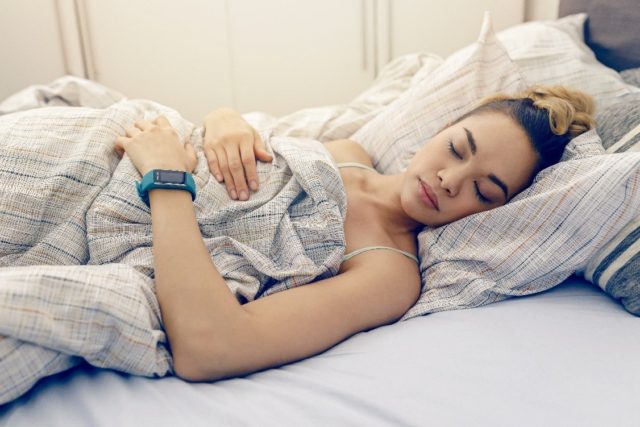KEMPELE, FINLAND March 16, 2018 Polar, the leader in wearable sports and fitness technology for more than 40 years, has revealed original insights into the sleep habits of the U.S. and 27 additional counties. Polar analyzed an anonymized user sample of over 6 million sleep nights to provide a unique look into weekend and weekday patterns, differences between men and women, average interruptions and more. The announcement comes following the launch of Polar Sleep Plus last summer, the brands proprietary sleep tracking and analysis system designed to offer insights and guide users toward better sleep habits.

When it comes to sports performance and fitness, sleep and rest are as equally important as training and nutrition, says Marco Suvilaakso, Chief Strategy Officer at Polar Global. Sleep plays a major part in recovery, and monitoring sleep gives you a better idea of your sleep habits and sleep quality. With Polar Sleep Plus and Polar Flow, your data is analyzed to provide feedback that helps you better understand your sleep habits and the impact they have on your fitness, health and quality of life. By learning how much and how well you sleep, you can begin recognize which aspects of your daily routine needs adjusting.
Global Sleep Insights
A good nights sleep consists of long, uninterrupted sleep segments. Tracking sleep over time offers insight into individual patterns and baselines, empowering users to change their sleep habits. Below are global insights based on 6 million nights of Polar user data:
- The average global sleep time is 7 hours and 22 minutes, with Estonia claiming the longest time at 7 hours and 36 minutes, and Japan logging the least at 6 hours and 33 minutes.
- Women across the globe sleep longer and better than men, averaging 7 hours and 35 minutes, 22 minutes longer than men.
- The age group that sleeps the soundest without interruptions are 18-29 year-olds, who log 7 hours of actual sleep time on average. The 40-64 year-olds log the least sleep time globally at 6 hours and 50 minutes.
- Finns rank first for the best sleep continuity with a score of 3.4 out of 5 (five representing a very continuous sleep). China ranks last with a score of 2.7, indicating a fairly fragmented sleep.
- Hong Kong and Spain are the worlds night owls, falling asleep at 12:52 a.m. and 12:45 a.m., respectively. South Africans are the earliest to bed at 10:45 p.m. and the earliest to rise at 6:06 a.m.
U.S. Women & Men Sleep Habits
On average, U.S women go to sleep slightly earlier than men and sleep 20 minutes longer, clocking 7 hours and 31 minutes of sleep versus mens 7 hours and 11 minutes. Generally, American women and men wake up at the same time each morning, at 6:51 a.m. and 6:53 a.m. respectively.
U.S. Weekdays & Weekends Habits
Throughout the week, Americans go to sleep by 11:17 p.m. and wake up at 6:35 a.m., totaling 7 hours and 13 minutes of sleep time. Weekends account for an average of 29 more minutes of sleep; bedtimes shift to 11:49 p.m. and mornings dont start until 7:36 a.m.
U.S. Actual Sleep Time & Continuity
Overall, Americans experience fairly continuous sleep, scoring an average 3.3 out of 5 on Polars continuity scale. On average, Americans experience 21.1 short interruptions throughout the night, and 5.2 long interruptions. Although Americans average sleep time is 7 hours and 21 minutes, when Polar incorporates interruptions, the actual sleep time drops to 6 hours and 52 minutes.
Sleep can be largely overlooked in terms of general fitness and I dont think people truly understand the way it impacts training, says Bart Aernouts, BMC-Vifit Sport Pro Triathlon Team athlete. “By tracking my sleep with Polar A370, I learned how traveling affects my sleep. I found that my first night on a training camp in a different bed and with a longer travel and shorter night before the travel was a night with very low quality of sleep and a lot of interruptions. I was surprised to see how interrupted my sleep was on some nights. I tracked my sleep for eight nights during a training camp as an experiment but I will continue to track my sleep with Polar to learn how to improve my sleep quality and which bedtime routines can help to achieve this.”
Polar Sleep Plus automatically tracks sleep and gives valuable insights. The Polar A370 fitness tracker and Polar M430 GPS running watch monitor your movements via a built-in 3D accelerometer, which automatically detects when a user falls asleep and wakes up. Polars precise sleep metrics provide a detailed overview of your sleep every night, and Polar Flow provides feedback on ways to achieve better sleep. Learn more about tracking your sleep and sleep insights here, and get started with Polar Sleep Plus.
About Polar:
Polar is the innovator in heart rate monitoring, activity and sleep tracking and GPS sports training solutions for elite athletes, coaches and active fitness enthusiasts. For over 40 years, we have helped athletes understand, track and improve their performance. Our award-winning product range includes pioneering sports wearables that work elegantly with Polar training apps and cloud services.
Headquartered in Finland, Polar is a privately held company that operates in more than 80 countries. Polar products are sold through over 35,000 retailers globally. For more information, please visit polar.com.
